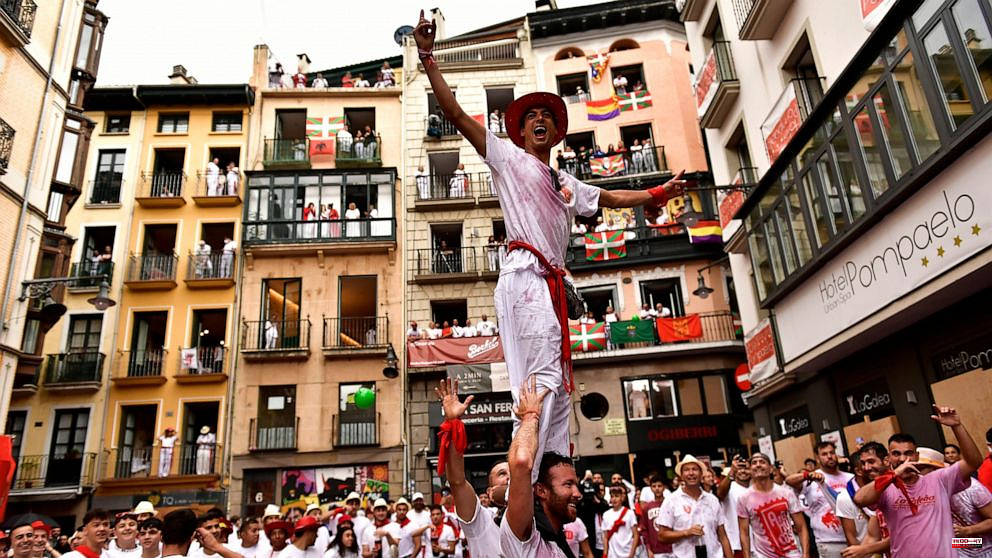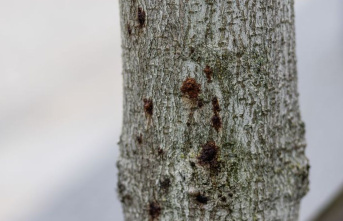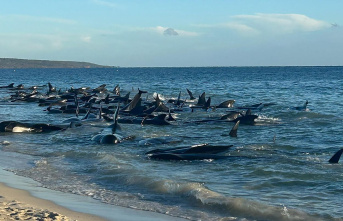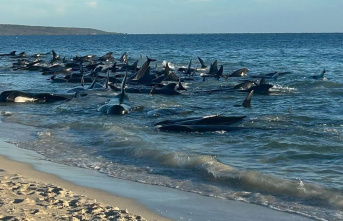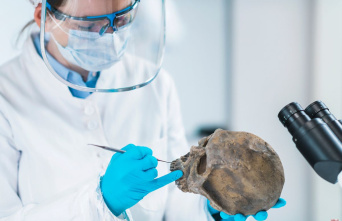PAMPLONA (Spain) -- Celebrations erupted Wednesday in Pamplona as the traditional "chupinazo," firework, was lit to kick off the San Fermin bull run festival. This event marks the end of a two-year hiatus caused by the coronavirus pandemic.
Rain didn't dampen the mood as the crowds packed the small town square in their traditional attire of white trousers, shirt, red sash, and neckerchief for the noon event. The revelers continued to spray each other with red wines after the fireworks went off.
The nine-day festival's highlight is the "encierros," or bull races, which begin on Thursday morning. Thousands of thrill seekers race like mad to avoid six bulls while they speed along a cobblestoned path to the bullring. The course is lined with wooden barricades and balconies that allow spectators to watch. The remainder of the day is reserved for cultural entertainment, such as eating, drinking and dancing.
Ernest Hemingway's novel in 1926, "The Sun Also Rises" made the festival famous. It hadn't been suspended from the Spanish Civil War in 1930s.
Juan Carlos Unzue, a former soccer player and coach, had the privilege of launching the rocket from the town hall balcony. After being diagnosed with amyotrophic lateral sclerosis (neurodegenerative disease ALS), Unzue was forced to quit coaching in 2018.
"This 'chupinazo" is dedicated to all the health workers and people who assisted us during the pandemic and all those with ALS. "Long live San Fermin!" he shouted to the seething crowd below from his wheelchair.
The festival's peak days bring Pamplona's population, which is around 200,000, to almost a million, particularly over the weekend. This includes many foreigners. Many people party all night and get some sleep outside.
Enrique Maya, mayor of Pamplona, said that although there was lots of excitement this year he was still a little concerned.
He said, "We feel there is such a desire among people for a good time it might get out hand."
Officials from the city have reminded people that coronavirus infection is on the rise and recommended the use of masks. This guideline will be difficult to follow due to the many sidelines parties and multitudinous runs.
The festival is usually relatively incident-free, with the majority of injuries occurring during runs or alcohol-related accidents.
Eight people were killed during the 2019 festival. Since 1910, sixteen people have been killed in bull runs. The last death was in 2009.
Pamplona has become home to many animal rights activists. As protestors against animal cruelty and urging tourists to not participate, many activists dressed up as dinosaurs ran the bull-run route.
Professional matadors kill the bulls involved in the bull runs in bullfights that take place every afternoon at the city ring.
The Spanish Constitution protects bullfights as part of Spain's cultural heritage. Despite the fact that it is still very popular, there has been a growing movement to stop it. Animal rights groups point out that 90% of Spaniards didn't attend bullfighting festivals in 2014-2015, when the issue was last surveyed.
In 2016, a major cloud was cast over San Fermin Festival by a gang-rape investigation. Officials in the city are sensitive to any mistreatment of women.
The slogan "Pamplona free of Sexual Aggressions" was used by organizers to launch a campaign to provide information and advice at a city center office to victims or witnesses to abuses as well as the general public.
A bill was eventually passed in the rape case that made consent a key determinant of sexual assault cases. This allows victims to avoid having to prove that they were intimidated or that violence was used against them.
------ Giles was reported from Madrid. This report was contributed by Joseph Wilson from Barcelona.

